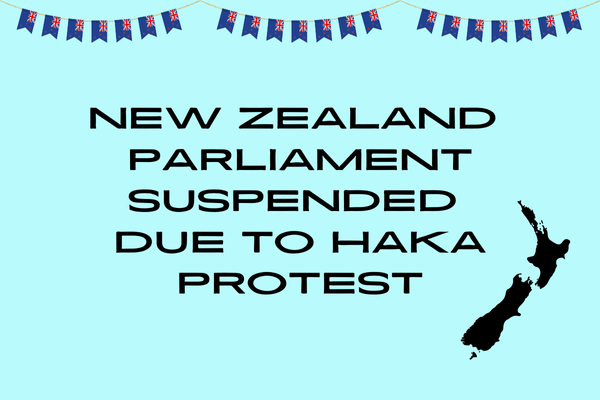On November 14th, 2024, the New Zealand Parliament was suspended after a Haka protest was performed over a controversial bill. A Haka is a traditional Māori dance that can represent a range of things such as a challenge, celebration, tribal identity, and social/political messages. The protest got started in parliament when Māori lawmaker Hana-Rāwhiti Maipi-Clarke ripped a copy of the bill in half before leading her colleagues in a Haka.
Hana-Rāwhiti Maipi-Clarke is the youngest member of parliament since 1853, at the ripe age of 22 years old. She vowed to protect the rights and culture of New Zealand’s native Māori people. Hana-Rāwhiti Maipi-Clarke was inspired by her grandfather, Taitimu Maipi, who is a member of the Māori activist group Nga Tamatoa. Hana-Rāwhiti Maipi-Clarke also happens to be grand-niece to a Māori language activist named Hana Te Hemara.
The bill, which is very controversial, aims to redefine New Zealand’s 1840 treaty with the indigenous Māori people. The treaty is considered New Zealand’s founding document as it lays out how the 2 groups agreed to govern the area. There’s two copies of the treaty, one in English and one in Māori. The tribes were promised broad rights so they could keep their land and protect their culture in return for letting the British govern. The two versions had differences in what power the chiefs had over affairs, land, and autonomy; the Crown breached both versions of the treaty.
The interpretation of clauses in the treaty still guides legislation and policy in New Zealand today. The treaty also brings attention to claims of Māori sovereignty. The ACT, a minor right wing party, were the ones to unveil the Treaty Principles Bill. The bill aims to place a narrower interpretation of the treaty, the goal is to give all New Zealanders equal rights under the law. The bill doesn’t have the support to pass parliament, but has still started protests all over the country and even in parliament. Many see it as reversing decades of policies meant to protect and empower the Māori people.
A Hīkoi, a walk or march for a protest, started in the north of New Zealand and eventually made its way to Wellington after 1,000 kilometers or about 621 miles. By the end of the Hīkoi more than 35,000 people gathered outside New Zealand’s parliament in Wellington. 27 licensed Māori translators signed an open letter to the senior ministers and the Prime Minister. The letter said that the proposed bill was based on a flawed translation of the treaty and failed “international translation ethical standards”. The Māori people are strong and will continue to fight to protect their culture














